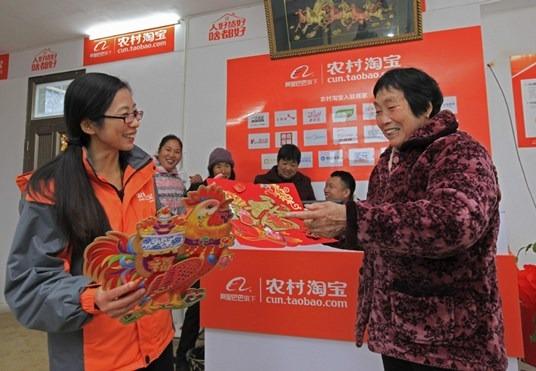 A villager in Ninghai county, Zhejiang province, receives New Year celebration decorations at a rural Taobao shop. (ZHANG YONGTAO / CHINA DAILY)
A villager in Ninghai county, Zhejiang province, receives New Year celebration decorations at a rural Taobao shop. (ZHANG YONGTAO / CHINA DAILY)
The Spring Festival is a joyous occasion when people reward themselves for a year's hard work by buying and preparing delicacies.
E-commerce-powered poverty elimination drive is expected to gain bigger momentum this year, as the internet facilitates not just the consumer end, but the industrial end as well. This means research and development, manufacturing and logistics for agricultural produce can be customized and automated through the adoption of artificial intelligence, big data and cloud computing.
Li Yongjian, researcher at the Chinese Academy of Social Sciences
Now it is also turning out to be an opportunity to reward others with cash.
Chinese e-commerce sites are rolling up their sleeves to help farmers sell their agricultural products, a combination of philanthropy and business that contributes to the nationwide eradication of poverty by the end of the year.
China's top e-commerce player Alibaba Group Holding Ltd announced a goal of helping farmers sell over 150 million kilograms of agricultural products during the month long festive season, which practically covers the majority of January.
The company is trying to maximize public exposure of local produce from impoverished regions by linking customers with a dedicated, one-stop landing page via Taobao's home page.
ALSO READ: Spring Festival to boost sales of imported goods in smaller cities
"Our purpose is to help farmers increase their income and make quality, yet affordable, agricultural produce more accessible to the vast consumer group," said Li Shaohua, vice-president of Alibaba and general manager of its rural business unit Rural Taobao.
Dubbed "Rural Produce and Fresh Food", the channel hosts e-shops from 832 poor counties across China. Local products are displayed and introduced through vivid story telling in a variety of media formats.
Shanghai-based social commerce site Pinduoduo has allocated 4 billion yuan ($580 million) worth of cash rebates to encourage 500 million consumers buying everything from agricultural products to local specialties as they celebrate the Chinese New Year with their families.
From Dec 20, the platform garnered over 1,000 leading merchants who specialize in agricultural produce and encouraged them to bring their latest harvests to the site by providing subsidies of over 100 million yuan.
They employ data analysis to pinpoint and predict consumer needs.
"For instance, oranges, mangos, and high-quality rice from Northeast China have become sought-after items from top-tier cities consumers to those residing in smaller townships and even the rural areas," said Han Dongyuan, senior director of the new agriculture business unit at Pinduoduo.
Wang Ning, a cherry and mango seller participating in this year's Spring Festival gala, saw her 100,000 fruit orders being snapped up in 24 hours. A majority of the buyers came from fourth-and fifthtier cities. She employed data analysis from Pinduoduo to record sales in the past three years and made her predictions accordingly.
Prospective buyers are also expected to be drawn by livestreaming shows which exhibit farmers and local government officials coming together to promote goods and discuss opportunities and challenges of local interest.
During the last Nov 11 shopping festival held by Alibaba, agricultural product sales jumped 64 percent year-on-year to 7.4 billion yuan. A total of 370,000 livestreaming shows were conducted in September alone, which offered 1 billion agricultural items via online channels.
Alibaba's Li said the platform will look to cultivate 1,000 livestreaming hosts from poverty-stricken areas in 100 counties and help them each generate more than 10,000 yuan in monthly income. The platform will also work with media outlets such as China Central Television to curate professionally-produced content about fresh produce as well as the farms themselves.
Encouraging self-development and empowerment of the poor population through novel measures has proved to be an effective approach as China aims to achieve total poverty eradication by the end of this year, industry experts said.
"Multisectoral approaches, targeted strategies, leadership, constant innovation such as using e-commerce to connect farmers to markets have been core enablers of poverty alleviation in China by adding income and enhancing commitment," said Ehizuelen Michael Mitchell Omoruyi, executive director of the Center for Nigerian Studies at the Institute of African Studies in Zhejiang Normal University.
Technology plays a role not just in promoting sales and marketing since it improves agricultural efficiency from the production end. A variety of smart agricultural technologies from Pinduoduo precisely controlled temperature, time, and humidity for orange planting in an orchard in Yunnan province. This has greatly enhanced fruit quality and has translated into more robust sales.
"Technologies help standardize the growing process and monitor the maturity of fruits in a more efficient manner. We strive to empower more agricultural companies through technology tie-ups," Han said, adding that certain farmers saw their annual income jump five times after technology kicked in.
READ MORE: Families set to increase spending on snacks, banquet food and gift packages
"E-commerce-powered poverty elimination drive is expected to gain bigger momentum this year, as the internet facilitates not just the consumer end (i.e. making it easy for people to purchase), but the industrial end as well. This means research and development, manufacturing and logistics for agricultural produce can be customized and automated through the adoption of artificial intelligence, big data and cloud computing," said Li Yongjian, a researcher of the internet economy at the Chinese Academy of Social Sciences.
China has vowed to eradicate poverty in all poor counties and regions by this year to build a moderately prosperous society in all aspects.



